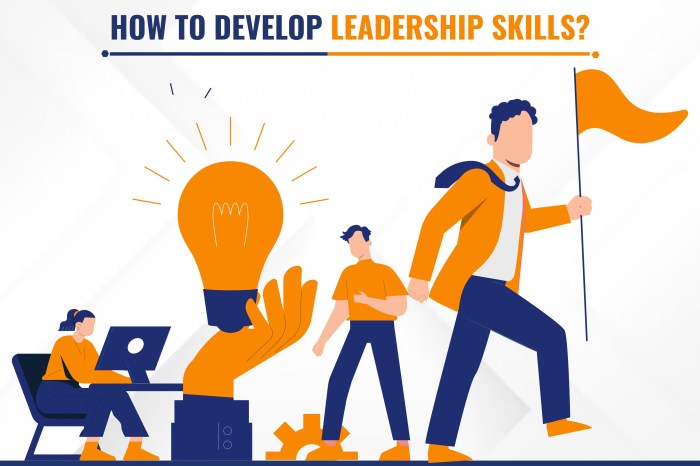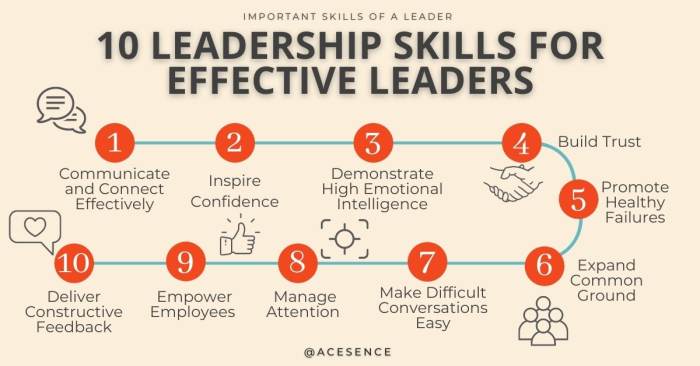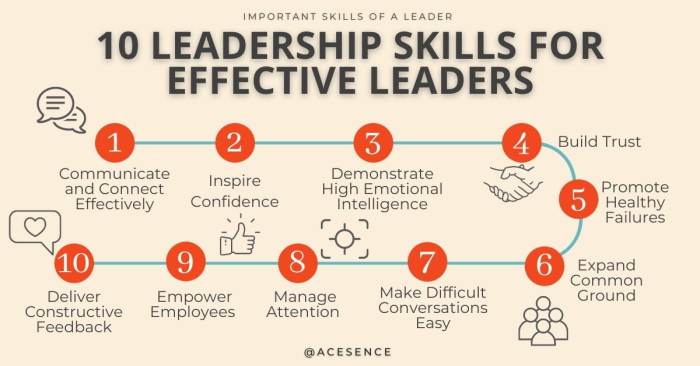Developing Leadership Skills sets the stage for this enthralling narrative, offering readers a glimpse into a story that is rich in detail with an American high school hip style and brimming with originality from the outset.
Leadership skills are not just buzzwords; they are the key to unlocking your full potential and achieving success in various aspects of life. From guiding teams to making tough decisions, honing these skills can truly make a difference.
Importance of Developing Leadership Skills
Developing leadership skills is crucial in both professional and personal life because it allows individuals to effectively guide, motivate, and inspire others towards a common goal. Strong leadership skills can positively impact team dynamics and productivity by fostering collaboration, communication, and problem-solving.
Positive Impact on Team Dynamics and Productivity
- Effective communication: Strong leaders can clearly communicate goals, expectations, and feedback to team members, reducing misunderstandings and conflicts.
- Empowerment: Leaders who empower their team members to make decisions and take ownership of their work foster a sense of autonomy and accountability.
- Conflict resolution: Skilled leaders can navigate conflicts within the team, promoting a harmonious work environment and maintaining focus on the task at hand.
- Decision-making: Leaders who make informed decisions based on input from team members can lead to better outcomes and higher productivity.
- Motivation: Inspiring leaders can motivate team members to perform at their best, leading to increased engagement and overall performance.
Key Leadership Skills to Develop

Developing essential leadership skills is crucial for becoming an effective leader. Let’s explore some key skills and how they contribute to successful leadership.
Communication
Effective communication is vital for a leader to convey ideas, inspire others, and build strong relationships. In a real-world scenario, a team leader who communicates clearly and listens actively can motivate team members to work towards a common goal.
Decision-making
Strong decision-making skills enable a leader to make tough choices with confidence and clarity. For instance, a CEO who can analyze information, weigh options, and make timely decisions can steer a company towards growth and success.
Problem-solving
Leaders with strong problem-solving skills can identify issues, generate solutions, and implement strategies to overcome challenges. In a business setting, a manager who can think creatively and resolve conflicts efficiently can foster a productive work environment.
Emotional Intelligence
Emotional intelligence helps leaders understand and manage their own emotions, as well as empathize with others. For example, a team leader with high emotional intelligence can resolve conflicts diplomatically, build trust among team members, and create a positive work culture.
Methods for Developing Leadership Skills
Developing leadership skills can be achieved through various strategies such as mentorship, training programs, workshops, and self-assessment tools. Each method offers a unique approach to enhancing leadership abilities.
Mentorship, Developing Leadership Skills
Mentorship plays a crucial role in developing leadership skills by providing guidance, support, and valuable feedback from experienced leaders. By having a mentor, individuals can learn from their expertise, gain insights into effective leadership practices, and receive personalized advice on how to navigate challenges in their leadership journey.
Training Programs
Participating in training programs focused on leadership development can help individuals acquire essential skills such as communication, decision-making, and conflict resolution. These programs often offer interactive sessions, case studies, and role-playing exercises to simulate real-life leadership scenarios and enhance practical skills.
Workshops
Attending workshops dedicated to leadership skills can provide a hands-on learning experience and opportunities for networking with other aspiring leaders. Workshops typically cover topics like team building, strategic planning, and emotional intelligence, allowing participants to gain valuable insights and strategies for effective leadership.
Self-Assessment Tools
Utilizing self-assessment tools like personality assessments, 360-degree feedback surveys, and leadership quizzes can help individuals identify their strengths, weaknesses, and areas for improvement as leaders. By reflecting on their own leadership style and receiving feedback from others, individuals can develop a greater self-awareness and tailor their development efforts accordingly.
Challenges in Developing Leadership Skills
Developing leadership skills can be a challenging journey filled with obstacles that can hinder personal growth and progress. It is important to identify these challenges and find effective strategies to overcome them in order to continue evolving as a strong and effective leader.
Resistance to Change
One common challenge in developing leadership skills is resistance to change. Many individuals struggle to step out of their comfort zones and adapt to new ways of leading. This resistance can prevent them from exploring different approaches and expanding their skill set.
- Embrace a growth mindset: Cultivate a mindset that values learning and growth, rather than sticking to familiar habits.
- Seek feedback: Actively seek feedback from peers, mentors, or coaches to identify areas for improvement and adjust your leadership style accordingly.
- Take on new challenges: Challenge yourself by taking on new projects or responsibilities that push you out of your comfort zone and encourage personal growth.
Lack of Self-Awareness
Another challenge is the lack of self-awareness, which can hinder a leader’s ability to understand their strengths, weaknesses, and the impact of their actions on others. Without self-awareness, it becomes difficult to make meaningful changes and improvements.
- Reflect on your actions: Take time to reflect on your decisions and behaviors to gain a better understanding of how they influence your leadership style.
- Seek 360-degree feedback: Ask for feedback from peers, subordinates, and supervisors to gain a comprehensive view of your leadership strengths and areas for development.
- Invest in self-assessment tools: Use tools like personality assessments or leadership surveys to gain insights into your leadership style and preferences.
Poor Communication Skills
Effective communication is essential for successful leadership, but poor communication skills can act as a significant barrier to growth. Leaders who struggle to communicate clearly and effectively may face challenges in inspiring and motivating their teams.
- Practice active listening: Focus on listening attentively to others and seeking to understand their perspectives before responding.
- Develop emotional intelligence: Enhance your emotional intelligence to better navigate interpersonal relationships and communicate with empathy and understanding.
- Take communication workshops: Enroll in communication workshops or courses to improve your verbal and nonverbal communication skills.
Impact of Leadership Skills on Career Growth

Leadership skills play a crucial role in shaping one’s career trajectory and can significantly impact professional growth. Individuals who possess strong leadership abilities are often able to accelerate their career advancement and unlock opportunities for success in various fields.
Examples of Successful Leaders
- Jeff Bezos: The founder and former CEO of Amazon, Bezos’s visionary leadership style helped transform the company from an online bookstore into a global e-commerce giant.
- Indra Nooyi: As the former CEO of PepsiCo, Nooyi’s strategic leadership skills led to the company’s expansion and increased market share during her tenure.
- Elon Musk: Known for his innovative leadership approach, Musk has successfully led multiple companies like Tesla and SpaceX to great heights through his bold decision-making and vision.
Developing Leadership Skills in Different Industries
When it comes to developing leadership skills, it’s important to consider how these skills can be tailored to specific industries such as tech, healthcare, finance, and education. Each industry comes with its unique challenges and opportunities for leadership development.
Tech Industry
In the tech industry, leadership skills often revolve around innovation, adaptability, and the ability to lead diverse teams with varying technical backgrounds. Leaders in tech need to stay up-to-date with the latest trends and technologies, while also fostering a culture of creativity and continuous learning.
Healthcare Industry
Leadership in the healthcare industry requires strong communication skills, empathy, and the ability to make critical decisions under pressure. Healthcare leaders must navigate complex regulatory environments, prioritize patient care, and lead multidisciplinary teams to deliver quality healthcare services.
Finance Industry
In finance, leadership skills are centered around strategic thinking, risk management, and financial acumen. Leaders in finance need to have a deep understanding of market trends, economic indicators, and financial strategies to drive growth and ensure financial stability for their organizations.
Education Industry
In the education sector, leadership skills involve effective communication, mentorship, and the ability to inspire and motivate students and educators alike. Educational leaders must navigate educational policies, implement innovative teaching methods, and create a supportive learning environment for all stakeholders.
